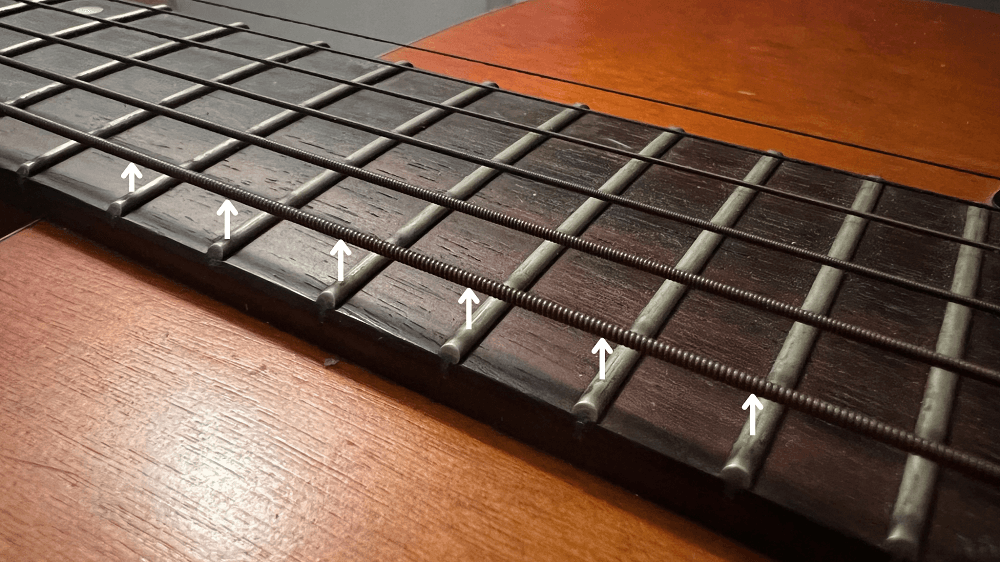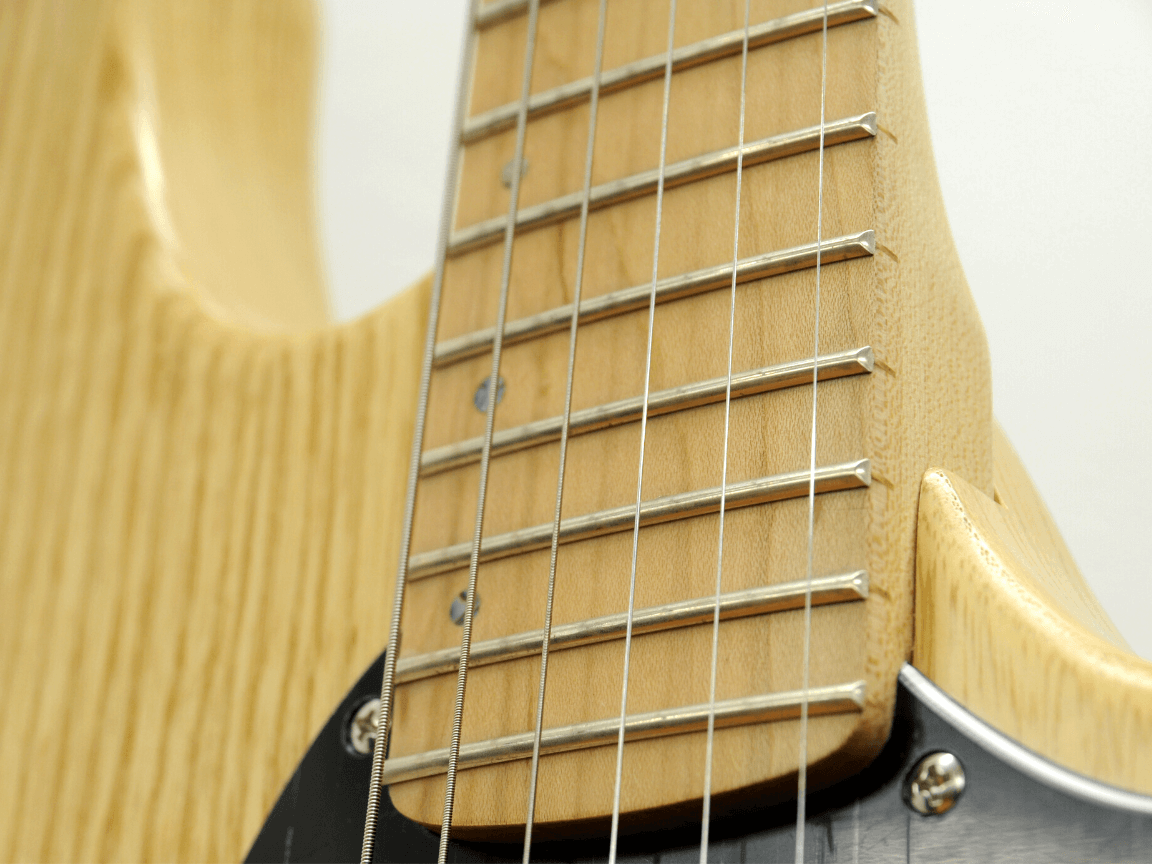Have you ever been strumming away on your guitar, only to be met with a loud buzzing sound?
If you’ve ever experienced this, you’re probably wondering, what causes this?
In this article, we’ll explore the various causes of buzzing guitar strings and provide tips on how to fix them without having to do much with your guitar.
We’ll look at the different types of buzzing, from fret buzz to string buzz, and discuss the different ways to address each one.
On top of that, we’ll also discuss the importance of proper setup and maintenance, and how it can help prevent buzzing in the first place.
Table of Contents
- Why do guitar strings buzz?
- Types of Buzzing
- Causes of Fret Buzzing
- How to fix string buzzing?
- Can a bad guitar cable cause buzzing?
- How do I stop buzzing when playing chords?
- How long does it take for new strings to stop buzzing?
- Do heavier strings cause more buzzing?
- How often should you change guitar strings if you play everyday?
- Final thoughts
Why do guitar strings buzz?
Guitar strings buzz when they vibrate against the frets or other parts of the guitar. This is usually caused by strings that are too loose, a bridge that is too high, or a neck that is too bowed. To reduce buzzing, make sure your strings are properly tuned and your bridge and neck are adjusted correctly. Additionally, check for any loose parts or worn-out frets that may be causing the buzzing.
Also, improper setup or maintenance can also result in buzzing.
This is because your guitar’s strings, frets, and other components need to be properly adjusted in order for them to work together harmoniously.
If any of these parts are out of tune or not aligned correctly, you may experience string buzz as a result.
Finally, poor technique can also cause strings to buzz.
If you’re not playing in the correct position or using too much force when strumming, it can cause the strings to vibrate against the frets and create a buzzing sound.
To reduce this type of buzzing, be sure to practice proper technique and use as light a touch as possible when playing.
Types of Buzzing
When it comes to buzzing, there are two main types: open string buzzing and fret buzzing.
Let’s take a closer look at each type:
– Open String Buzzing
Open string buzzing happens when the strings vibrate against the frets, causing an unpleasant buzzing sound and making it hard to play cleanly.
It usually happens when the string isn’t properly tightened or when the string height is set too low.
What this does is create a buzzing sound as the string vibrates against the frets.
As the word open suggests, this type of buzzing is what happens with open strings, meaning those that are not pressed down against the frets.
– Fret Buzzing
This type of buzzing is usually caused by a combination of things, such as high action, worn frets, or a poorly set-up instrument.
When the fret buzzes, it can create a very unpleasant sound and make playing difficult since all you hear is a buzz instead of the note you’re trying to play.
In order to fix this type of buzzing, it’s important to check that all frets are properly adjusted and set up and that the action is set correctly.
As opposed to open string buzzing, fret buzzing is what happens when the strings are pressed down against the frets.
So instead of the strings vibrating against the frets, they are being pressed down and buzzing as they try to reach their intended note.
Causes of Fret Buzzing
Now that we know the difference between open string buzzing and fret buzzing, let’s take a look at the causes of fret buzzing in general.
If you’re experiencing fret buzzing on your instrument, it could be caused by any of the following:
– Low-quality strings
Low-quality strings can also cause fret buzzing, as they are more likely to be out of tune and cause buzzing as they vibrate against the frets.
It depends on the type of strings you’re using, but if they are cheap, it’s very likely that they can be the cause of your fret buzzing.
This is because cheap strings are made from lower quality materials, which can’t hold their tuning as well and cause buzzing.
Oftentimes, they will vibrate and create a buzz even if the action is set correctly and the frets are in good condition.
– Poorly adjusted action
Another common cause of fret buzzing is the action being set too low.
If the action is not adjusted correctly, it can cause the strings to be closer to the frets and create a buzzing sound even when they aren’t pressed down.
This is most likely the cause of open string buzzing, as the strings are vibrating against the frets and not being pressed down.
However, fret buzzing can also be caused by low action since the strings will be too close to the frets and buzz when you play.
– Worn frets
Worn frets can also cause fret buzzing since the strings will not be able to properly vibrate and produce a clean note.
Fret wear is something that happens naturally over time, as the strings create friction against the metal of the frets.
If your instrument has old or worn-out frets, it can create a buzzing sound that will interfere with your playing.
I’ve found that this is the least common cause of fret buzz, but it is still possible that it happens to you with old instruments.
– Poorly cut nut
Another cause of fret buzz is a poorly cut nut.
The nut is the part of your instrument that holds the strings in place, and if it’s not properly cut for the strings to sit in, it can cause buzzing.
Let’s expand on this a bit…
A properly cut nut should always be higher than the fretboard and should have a small amount of space between it and the frets so that the strings don’t vibrate against them when you play.
If the nut is set too low, it can cause your strings to buzz since they will be closer to the frets and vibrate against them.
This is a very common cause of fret buzz and can usually be fixed by adjusting the nut height or replacing the nut altogether.
How to fix string buzzing?
1. Adjust the truss rod
If you’re experiencing open string buzzing on your guitar, there are a few steps you can take to fix it.
The first step is to adjust the truss rod.
The truss rod is a metal rod that runs along the length of the neck and is used to adjust the curvature of the neck.
You can adjust the truss rod by tightening or loosening it, if the strings are buzzing, the truss rod may be too loose, so you’ll need to tighten it.
However, be careful not to over-tighten the truss rod, as this can cause damage to the neck in the long term.
2. Adjust the bridge
The second step is to adjust the bridge and make sure it’s at the proper height.
Your guitar bridge is the piece of the guitar that holds the strings in place on the body.
The bridge should be set so that the strings are close to the frets without actually touching them.

If the bridge is too low, it can cause open string buzzing, in which case you’ll need to raise it slightly.
To fix this, you can use a small Allen key to adjust the bridge screws until the strings are set at the correct height or at least close to it.
3. Change the strings
The third step is to change the strings and make sure they are of the correct gauge for your guitar.
If you’re using old or worn strings, they may be too loose and thus cause open string buzzing.
In this case, replacing them with new strings of the correct gauge will often solve the problem.

If this doesn’t fix it, and you’ve checked the rest of the steps, then it’s likely that you have a structural issue with your guitar, such as a neck problem or an improperly fitted bridge.
Which would require the help of a professional luthier.
4. Lower the action
Another step that you can take is to lower the action of your guitar.
The action of a guitar refers to the space between the strings and the fretboard, as shown in the image below:

If the action is too low, like very low, then make sure to adjust it in a way that open strings can be played freely.
This should be the benchmark or your sign that is well set or not.
5. Check the nut
Make sure that the string isn’t touching any part of the guitar other than in between the nut and bridge saddles.
Also, there shouldn’t be any dirt or debris trapped in either area, and the nut should look in good condition.

If the nut is chipped or worn down, it will need to be replaced for the string buzzing to stop.
On the other hand, if it’s cracked or damaged, it can cause buzzing when you play, so you’ll need to replace it.
I would advise you to take your guitar to a reputable repair shop and have them look at the nut and make any necessary adjustments.
6. Check your fretboard
Lastly, check your fretboard for any raised frets or sharp edges.
If the string is coming into contact with the fretboard, it will cause buzzing and create an unpleasant sound.

To fix this problem, you can either use steel wool to smooth down the offending spots or have a professional guitar tech do it for you.
I would also go fret by fret and string by string to make sure that all of them are properly seated on the fretboard.
Can a bad guitar cable cause buzzing?
A bad guitar cable can definitely cause buzzing, but this won’t always be the case.
This is because a guitar cable is what carries the electric signal from your guitar to your amplifier, and if the cable is faulty or of poor quality, it can cause interference in the signal, resulting in a buzzing sound.
To avoid this, make sure to use a quality cable that is designed for electric guitars.

Also, if you’re using a long cable, make sure it’s shielded to prevent interference from external sources.
Finally, if you’re using multiple cables, try to keep them away from each other to reduce the risk of crosstalk.
How do I stop buzzing when playing chords?
If you’re experiencing buzzing when playing chords, the first thing to do is check your guitar’s setup.
Make sure the strings are properly tuned and the action is set correctly.
If the strings are too low, you may need to adjust the truss rod or bridge saddles to raise the strings.
Additionally, check the nut slots to make sure they’re not too low, which can cause buzzing.
If the buzzing persists, you may need to replace the strings or the frets.
Also, make sure you’re using the correct fingerings when playing chords.
If you’re using too many fingers, or if you’re pressing down too hard, you may be causing the buzzing yourself.
So before making any changes to your guitar, make sure it’s not happening because of improper technique.
How long does it take for new strings to stop buzzing?
It really depends on the type of strings you are using, as well as the type of instrument you are playing.
Generally speaking, it can take anywhere from a few days to a few weeks for new strings to stop buzzing, if they buzz in the first place.
New strings shouldn’t cause buzzing when you play.
If you’re using steel strings, it can take a bit longer than if you’re using nylon strings.
Also, it’s important to make sure that the strings are properly stretched and tuned, as this will help reduce buzzing.

Additionally, if your instrument has adjustable bridges, you can adjust the height of the strings to reduce buzzing.
If the buzzing persists, it may be a sign that the strings are not compatible with your instrument, or that the instrument needs to be serviced.
Do heavier strings cause more buzzing?
Whether heavier strings cause more buzzing or not depends on a few factors.
Firstly, the type of strings you use is important I would say.
Heavier gauge strings will generally cause more buzzing than lighter gauge strings, as the thicker strings will vibrate more and create more tension on the neck of the guitar.
Secondly, the quality of the strings is also important.
Poor quality strings may cause more buzzing than higher quality strings, as they are more likely to be out of tune and vibrate at different frequencies.
On the other hand, the setup of the guitar is also important, which means…
If the action of the strings is too low, or the nut and bridge are not properly adjusted, this can cause more buzzing.
How often should you change guitar strings if you play everyday?
If you play guitar every day, it’s important to change your strings regularly.
Depending on the type of strings you use and how often you play, you should change them every two weeks or so.

- If you’re a professional musician, you may want to change them even more often.
- If you play a lot and use heavier strings, you may need to change them every week.
- If you’re a beginner or you don’t play as often, you may be able to go longer between changes.
It’s important to check your strings regularly for signs of wear, such as fraying, rusting, or discoloration.
So every so oftern, check it out, and if you notice any of these signs, it’s time to change your strings.
Taking good care of your strings will ensure that your guitar sounds its best and that you can keep playing for years to come.
Final thoughts
In summary, buzzing guitar strings can be a frustrating issue for guitarists.
It can be caused by a variety of factors, including poor string quality, improper setup, and even environmental conditions.
Fortunately, there are a few simple solutions that can help you get your guitar sounding great again.
For example, you can try changing your strings, adjusting the truss rod, or using a humidifier to help keep the strings from drying out.
With a little bit of patience and the right tools, you can get your guitar sounding like new in no time.

More than 10 years of experience playing and writing about guitars! When not writing, I can be found strumming away some Johnny Cash tunes. Favorite all time guitar is the Gibson Les Paul. #TeamGibson




